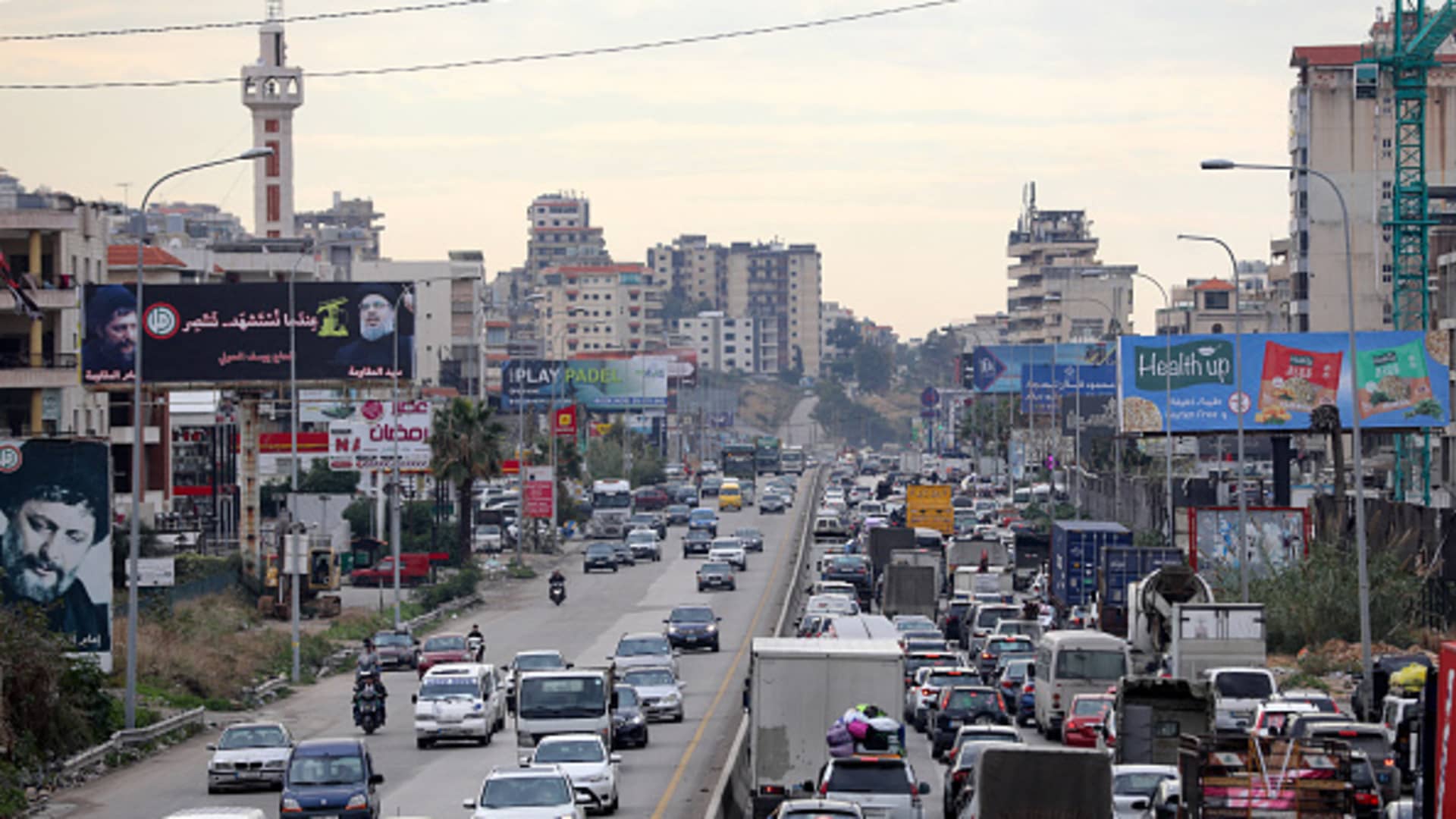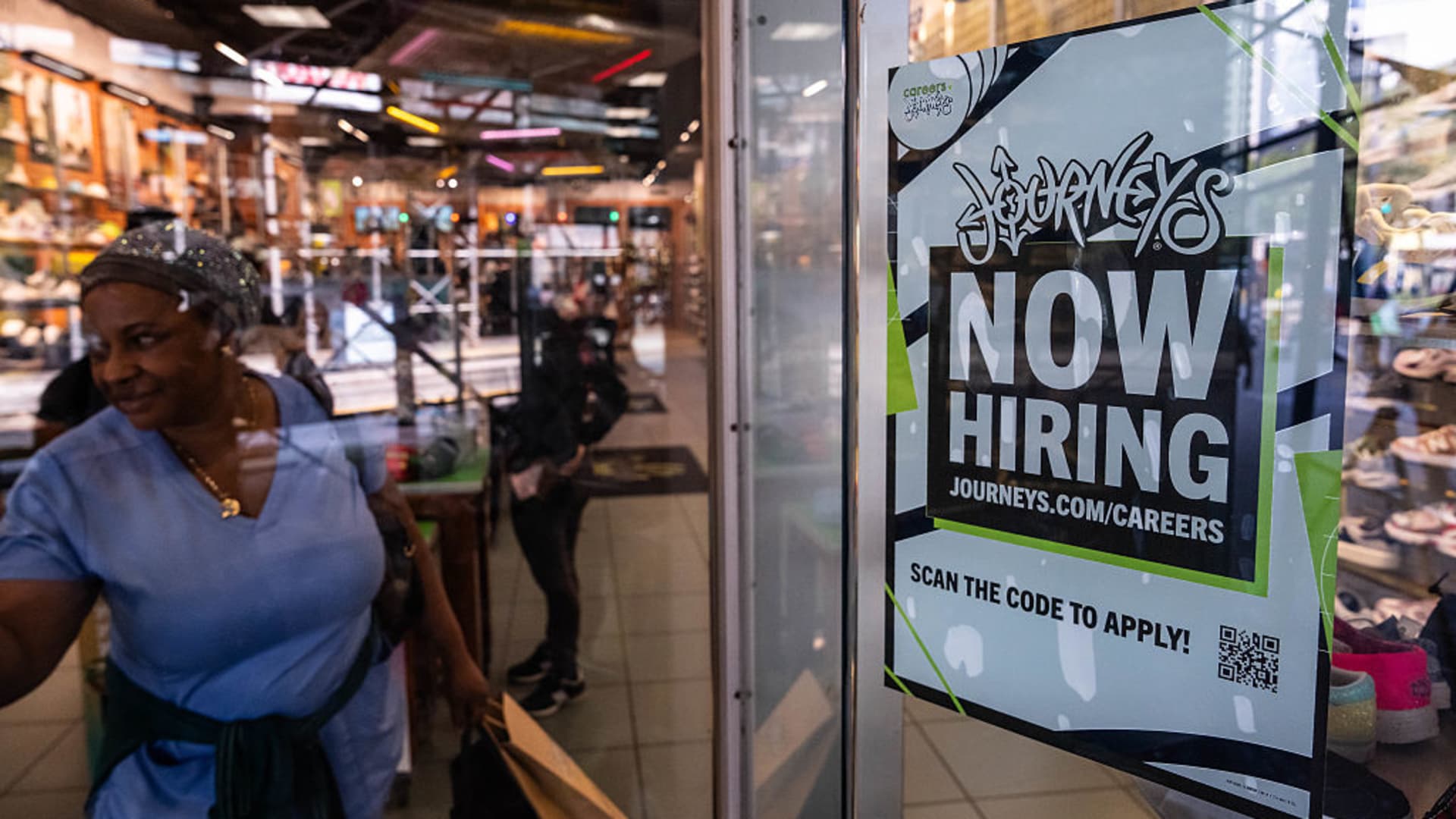With Trump pressure and a ‘new Lebanon,’ can Hezbollah’s shadow economy be dismantled?

Vehicles transporting people who had fled southern Lebanon are slowed down by heavy traffic on the outbound road from Beirut, in the area of Khaldeh on November 28, 2024, a day after a cease fire between Israel and Hezbollah took hold.
Ibrahim Amro | Afp | Getty Images
Up until a few months ago, the drive from Beirut’s international airport through the Lebanese capital city’s southern suburbs used to feature a stream of pro-Iranian and Hezbollah-themed propaganda.
Hassan Nasrallah, the charismatic former leader of the Iran-backed group who was killed in Beirut last year, stared down at you from billboards while you drove along Imam Khomeini Road, named after the late founder of Iran’s Islamic Republic. Images of Hezbollah leaders were interspersed with dramatic murals of fallen Iranian spy commander Qasem Soleimani.
Now many of those images have been replaced with western and local brands. In June dozens of those billboards along the highway instead featured Formula One racecar driver Lewis Hamilton advertising shaving products.
Many of the new posters also feature patriotic, unifying messages that replaced the formerly sectarian signage — an attempt by Lebanon’s new Prime Minister Nawaf Salam to encourage “A New Era for Lebanon,” just in time for the summer tourism boom the Mediterranean country is hoping for after months of war.
In this “new” Lebanon, Hezbollah is being forced to operate in the shadows — more than ever in the group’s over 40-year history.
The Iranian proxy, which controls several parts of Lebanon as a sub-state group and is designated a terrorist organization by Washington, has always looked for creative ways to evade U.S. sanctions. But since Israel’s aggressive assault – its most deadly since the 2006 war – Hezbollah’s leadership and financial infrastructure have been left in tatters.
“Hezbollah finds itself in its greatest predicament since its foundation. The Israeli war against Lebanon greatly hit the party and its infrastructures, assassinating the party’s senior military and political leaders including Secretary-General Hassan Nasrallah,” Joseph Daher, author of “Hezbollah: The Political Economy of Lebanon’s Party of God,” told CNBC.
“The regions majorly inhabited by the Shia population have been greatly targeted, destroying extensively civilian housing and infrastructures as well,” he said.
A vehicle carries the coffins of former Hezbollah leaders Hassan Nasrallah and Hashem Safieddine, who were killed in Israeli airstrikes last year, during a public funeral ceremony, in Camille Chamoun Sports City Stadium, on the outskirts of Beirut, Lebanon, on Feb. 23, 2025.
Thaier Al-sudani | Reuters
The group, whose political wing also holds seats in parliament, still wields significant political power in Lebanon, which last held parliamentary elections in 2022. Despite losing the most significant number of seats in the group’s political history, it still held tight to a 62-seat coalition in the 128-member parliament.
While Hezbollah “will not disappear because it has a strong, disciplined and organized political and militant structure, and benefits from the continued assistance of Iran,” the group “has become increasingly politically and socially isolated outside Lebanon’s Shia population,” Daher said.
financial meltdown crippled the country and its currency, Hezbollah remained able to fund its base and illicit activities. It operated cash-only businesses and ran black market U.S. dollar exchanges.
This strategy will continue despite pressure on their finances, regional analysts say, due to the extreme difficulty of tracking informal, cash-only transactions.
Lebanon’s economy “operates more than 60% on cash exchanges, the circulation of which the state cannot trace,” Daher said. “It is thanks to the segment of this cash in circulation that Hezbollah smuggles into Lebanon that it finances its activities and pays its employees and helps its popular base, alongside other sources of funding, both licit and illicit.”
However, the U.S. under President Donald Trump’s administration is placing renewed pressure on Lebanon’s new government to crack down on Hezbollah’s illicit activities.
rejected.
“Hezbollah’s not going to disarm because you ask them nicely,” Levitt said. “But we have to enable the government of Lebanon to do this, give them the capability to do it, and have their back when they do it.”
That requires a combination of carrots and sticks, former U.S. officials say – ironically, tools that have in many cases been weakened by the shrinking of U.S. government resources under the Trump administration.

Alexander Zerden, principal at Washington-based risk advisory firm Capitol Peak Strategies who formerly served at the U.S. Treasury Department’s Office of Terrorism and Financial Intelligence, outlined some of those potential approaches.
“On the offensive side, the U.S. can and will likely continue to target Hezbollah financial networks inside and outside of Lebanon. The U.S. will seek to deny Hezbollah access to Syria, including lucrative reconstruction contracts,” Zerden said.
“On the incentive side, direct tools are more limited with reductions in diplomacy and development capabilities,” he noted – one example of that being the gutting of USAID, which served as a powerful diplomatic vehicle. “However,” he added, “there appears to be space for the U.S. to support economic reforms.”
For Ronnie Chatah, a Lebanese political analyst and host of The Beirut Banyan podcast, what’s truly needed is international pressure that would push Iran to relinquish its involvement in Lebanon.
“What has not yet shifted in Lebanon’s favor is the international aspect, meaning finding a way for Iran to abandon Lebanon that I think can only happen by strategic diplomacy,” said Chatah, whose father, a former Lebanese finance minister, was killed in a suspected Hezbollah assassination plot.
“If the Trump administration wants peace the way it says repeatedly, if Donald Trump wants the Nobel Peace Prize too, there has to be some way forward for Lebanon to take the spotlight and to find a peaceful resolution that in some ways satisfies Iran’s terms,” he told CNBC from Beirut.
What’s been done so far by both the U.S. and Lebanese governments is important, but will not ultimately break Hezbollah’s power in the country, Chatah warned.
“The window of opportunity is now. It’s not tomorrow, and unfortunately, it’s a closing window,” he said. “The intent is not enough. Whether it’s by the Trump administration or even whether it’s by the Lebanese president, the intention is not enough.”
[title_words_as_hashtags




